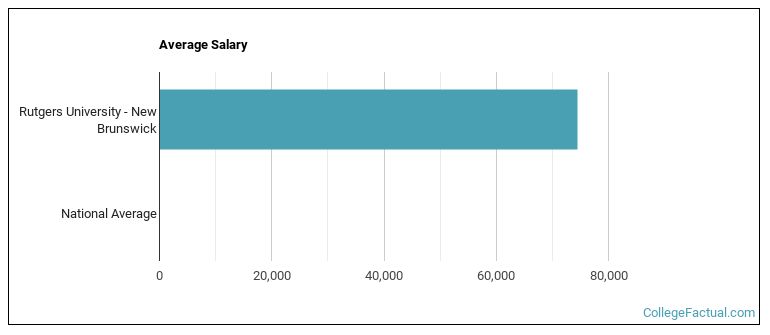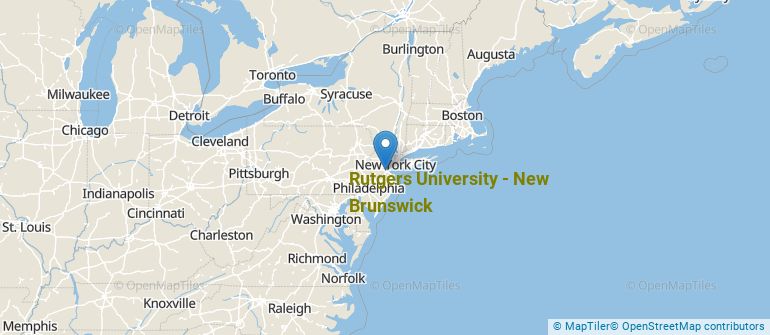 by our College Data Analytics Team
by our College Data Analytics Team
In its yearly rankings, College Factual analyzes over 2,000 colleges and universities to determine which ones are the best in a variety of categories, such as overall value, quality, diversity, which schools are the best for each major, and much more.
Rutgers University - New Brunswick was awarded 135 badges in the 2025 rankings. The highest ranked major at the school is clinical/medical laboratory science.
Explore the best ranked schools for the programs you are most interested in.
Rutgers New Brunswick is ranked #74 out of 2,152 schools in the nation for overall quality on College Factual's 2025 Best Colleges list. This lands it a coveted spot in the top 5% of all colleges and universities in the country. This is an improvement over the previous year, when Rutgers New Brunswick held the #98 spot on the Best Overall Colleges list.
Out of the 45 colleges in New Jersey, Rutgers New Brunswick is ranked at #2.
See all of the rankings for Rutgers University - New Brunswick.
If you're applying to Rutgers University - New Brunswick you'll face some tough competition, since the school's acceptance rate is only 66%. Definitely don't wait until the last minute to submit your application, since applying early may be in your favor.
About 50% of students accepted to Rutgers New Brunswick submitted their SAT scores. When looking at the 25th through the 75th percentile, SAT Evidence-Based Reading and Writing scores ranged between 630 and 720. Math scores were between 640 and 760.
Learn more about Rutgers University - New Brunswick admissions.
The student to faculty ratio is often used to estimate how much interaction there is between professors and their students at a college or university. At Rutgers University - New Brunswick, this ratio is 15 to 1, which is on par with the national average of 15 to 1. That's not bad at all.
When estimating how much access students will have to their teachers, some people like to look at what percentage of faculty members are full time. This is because part-time teachers may not have as much time to spend on campus as their full-time counterparts.
The full-time faculty percentage at Rutgers University - New Brunswick is 58%. This is higher than the national average of 47%.
Rutgers University - New Brunswick has a freshmen retention rate of 92%. That's a good sign that full-time students like the school and their professors enough to want to stick around for another year. It's also a sign that the admissions team did a good job in choosing applicants who were a good fit for the school.
Students are considered to have graduated on time if they finish their studies within four years. At Rutgers New Brunswick the on-time graduation rate of first-time, full-time students is 67%. That is great when compared to the national average of 33.3%
Find out more about the retention and graduation rates at Rutgers University - New Brunswick.
During the 2017-2018 academic year, there were 35,844 undergraduates at Rutgers New Brunswick with 33,788 being full-time and 2,056 being part-time.
| $0-30 K | $30K-48K | $48-75 | $75-110K | $110K + |
|---|---|---|---|---|
| $14,026 | $14,893 | $19,950 | $27,099 | $30,640 |
The net price is calculated by adding tuition, room, board and other costs and subtracting financial aid.Note that the net price is typically less than the published for a school. For more information on the sticker price of Rutgers New Brunswick, see our tuition and fees and room and board pages.
While almost two-thirds of students nationwide take out loans to pay for college, the percentage may be quite different for the school you plan on attending. At Rutgers New Brunswick, approximately 42% of students took out student loans averaging $8,040 a year. That adds up to $32,160 over four years for those students.
Get more details about paying for Rutgers University - New Brunswick.

See which majors at Rutgers University - New Brunswick make the most money.
Get more details about the location of Rutgers University - New Brunswick.

Contact details for Rutgers New Brunswick are given below.
| Contact Details | |
|---|---|
| Address: | 83 Somerset St, New Brunswick, NJ 08901-1281 |
| Phone: | 848-445-4636 |
| Website: | https://newbrunswick.rutgers.edu/ |
| Facebook: | http://www.facebook.com/pages/New-Brunswick-Newark-and-Camden/Rutgers-University/172636137574?utm_source=flag_footer&utm_medium=web&utm_campaign=flag_footer |
| Twitter: | http://www.twitter.com/RutgersU |
| Most Popular Majors | Bachelor’s Degrees | Average Salary of Graduates |
|---|---|---|
| Social Work | 765 | $39,936 |
| Computer Information Systems | 748 | $80,448 |
| Public Health | 668 | $45,408 |
| General Psychology | 556 | $31,280 |
| Landscape Architecture | 531 | $44,459 |
| Human Resource Management | 531 | $49,441 |
| Nursing | 495 | $87,594 |
| Information Science | 481 | $56,360 |
| Finance & Financial Management | 418 | $68,338 |
| Health & Physical Education | 396 | $28,820 |
Online courses area a great option for busy, working students as well as for those who have scheduling conflicts and want to study on their own time. As time goes by, expect to see more and more online learning options become available.
In 2022-2023, 23,425 students took at least one online class at Rutgers University - New Brunswick. This is a decrease from the 37,641 students who took online classes the previous year.
| Year | Took at Least One Online Class | Took All Classes Online |
|---|---|---|
| 2022-2023 | 23,425 | 3,758 |
| 2021-2022 | 37,641 | 7,587 |
| 2020-2021 | 44,109 | 40,625 |
| 2018-2019 | 12,869 | 2,501 |
Learn more about online learning at Rutgers University - New Brunswick.
If you’re considering Rutgers University - New Brunswick, here are some more schools you may be interested in knowing more about.
Curious on how these schools stack up against Rutgers New Brunswick? Pit them head to head with College Combat, our free interactive tool that lets you compare college on the features that matter most to you!
Footnotes
*The racial-ethnic minorities count is calculated by taking the total number of students and subtracting white students, international students, and students whose race/ethnicity was unknown. This number is then divided by the total number of students at the school to obtain the racial-ethnic minorities percentage.
References
More about our data sources and methodologies.